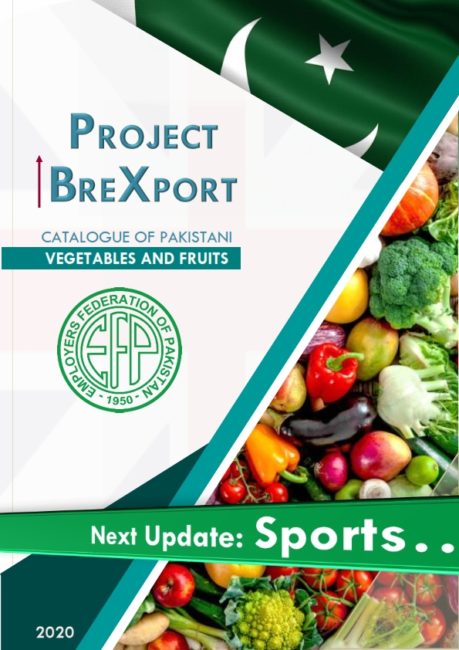PROJECT BREXPORT: A RESEARCH CATALOGUE ON FRUITS AND VEGETABLES
The UK is a heavy importer of fresh and organic produce of the primary sector, such as fruits and vegetables. Many of the freshly produced items that comprise of imports are sourced from countries outside of the EU region. Most of these imports are tariff-free under existing EU trade agreements but after the Brexit, this scenario might change.
The prospect of a ‘no deal’ Brexit cannot be ignored and we now find ourselves in a very fluid and rapidly changing political environment. A ‘no deal’ situation could have a major impact on UK consumption in imported vegetables and fruits. It is crucial that exporters and policy makers in Pakistan understand this if any chance of growth in exports in the fruit and vegetable industry is to be achieved. Under a ‘no deal’ scenario, the EU would consider the UK as a third country and so the trade agreements the EU has with other countries shall no longer apply to UK. This could open the door to increased volumes of imports, possibly of a lower phytosanitary standard, but it could also make UK’s horticultural production more competitive. This, in turn, may create notional opportunities for import substitution from EU to other regions that are competitive in pricing and match the quality standards.
In response, The EFP Economic Council has decided to take the onus on itself and publish a series of publications on well-researched sectors included in the PAK-UK trade. All publications shall accompany catalogues of sector under study, which shall undoubtedly help strengthen existing trade linkage and create new channels of trade between UK retailers and Pakistani exporters. The emerging political developments shaping up in Britain, following the Brexit, present immense possibilities for non-EU members to capture a share of the British consumer market. For Pakistan, all future trade strategies with Britain must incorporate the existing export biases that are largely skewed toward consumer durables, cotton, textiles and garments. As per World Bank, these items make up 82% of Pakistan’s trade with Britain and the consumables such as fruits mostly cater to markets within communities of the Pakistani-British diaspora. It is very important to understand that a major part of this consumer exports includes processed food and wheat and no other categories such as foods, fruits, fish, which we believe, is primarily due to strict Sanitary and Phytosanitary Standards (SPSS), and other certifications and compliance requirements set by UK authorities.
The factors identified greatly limit the optimum trade potential between Pakistan and Britain and were put up before the Pakistan’s High Commissioner to UK by the EFP Economic Council (EFP-EC) on 15th October 2019. In this regard, the EFP-EC has initiated a research project by the name of BreXport. The core intention behind this project is to present a catalogue of exportable Pakistani commodities that have supply readily available for shipment to the UK.

